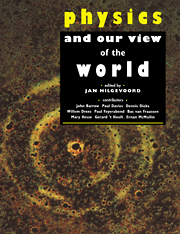Book contents
- Frontmatter
- Contents
- Foreword
- Introduction
- 1 Questioning the answers or Stumbling upon good and bad Theories of Everything
- 2 Theories of Everything
- 3 The scientific view of the world: introduction
- 4 Enlarging the known world
- 5 The world of empiricism
- 6 Has the scientific view of the world a special status compared with other views?
- 7 Quantum theory and our view of the world
- 8 Interpretation of science; science as interpretation
- 9 Problems in debates about physics and religion
- 10 The mind of God
- 11 The sources of models for God: metaphysics or metaphor?
- Discussion
- Notes on contributors
- Bibliography
- Index
9 - Problems in debates about physics and religion
Published online by Cambridge University Press: 04 December 2009
- Frontmatter
- Contents
- Foreword
- Introduction
- 1 Questioning the answers or Stumbling upon good and bad Theories of Everything
- 2 Theories of Everything
- 3 The scientific view of the world: introduction
- 4 Enlarging the known world
- 5 The world of empiricism
- 6 Has the scientific view of the world a special status compared with other views?
- 7 Quantum theory and our view of the world
- 8 Interpretation of science; science as interpretation
- 9 Problems in debates about physics and religion
- 10 The mind of God
- 11 The sources of models for God: metaphysics or metaphor?
- Discussion
- Notes on contributors
- Bibliography
- Index
Summary
Introduction
It has been said that ‘scientific realism is a majority opinion whose advocates are so divided as to appear a minority’ (Leplin 1984, p. 1). Something similar happens in the reflections on physics and theology in this volume: even though most contributors share a positive attitude towards religion, they are strongly divided. The discussion is not merely one about answers, for instance whether or not the Universe had a beginning, and whether that supports belief in a divine ‘first cause’. The real disagreements concern the questions, the way the problem is posed. Failures to communicate may have their roots in that which is considered obvious, and thus often left implicit, rather than in that which is the explicit topic of the debate. Thus, the aim of this chapter is to achieve a clearer view of the variety of approaches in relating physics to religion.
Before embarking on the main topic, I will briefly argue for the relevance of such reflections.
There is a public relations problem for theology in an age of science. Affiliation with churches is declining. ‘Belief in God’ is considered by many to be an option which is superfluous, outdated, falsified, meaningless, or a matter of private taste.
- Type
- Chapter
- Information
- Physics and our View of the World , pp. 188 - 225Publisher: Cambridge University PressPrint publication year: 1994



